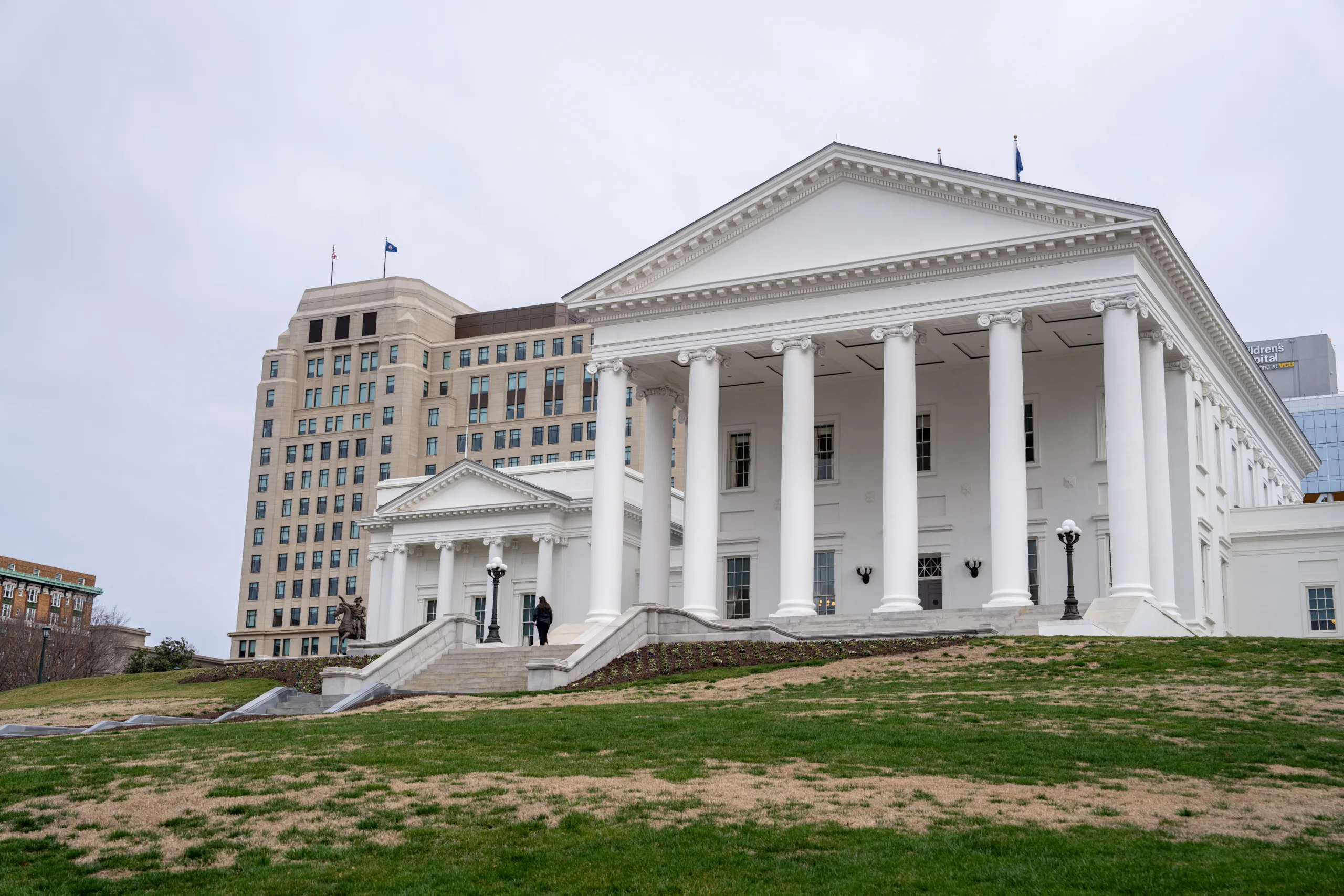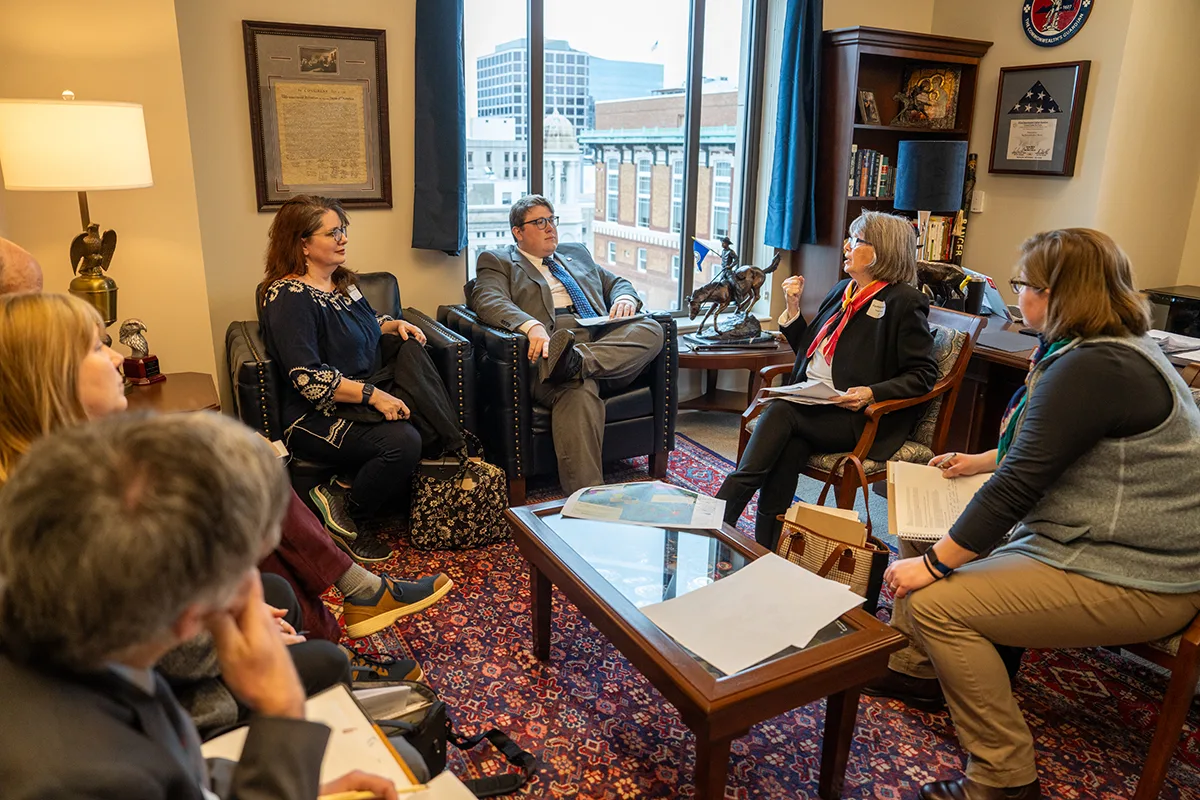The following text was sent out via email on Feb. 21, 2024. Sign up for PEC email alerts →

Dear Supporter,
The legislative landmark of Crossover Day (the midpoint of the General Assembly and the last day each chamber could act on its own legislation) having come and gone, the shape and fate of many bills and priorities are now in focus.
The appetite for bold new conservation initiatives was light in a year defined by budgetary limitations stemming from fears of a potential recession and the end of pandemic-based federal fiscal relief.
However, some notable progress was made on a few key priorities of the environmental community, including bills that incentivize community and parking lot solar, help localities preserve rural unpaved roads, and increase the transparency of utility votes within the decision-making process of regional transmission operator PJM, among others.
Funding for Virginia’s Outdoors
One of our conservation priorities, Virginia’s Great Outdoors Act, is a proposal to provide permanent, dedicated funding for conservation programs. This bill received bipartisan support and was broadly and enthusiastically received, with both the House Natural Resources Subcommittee and Agriculture, Chesapeake, and Natural Resources Committee voting in favor to pass the bill and re-refer it to the House Appropriations Committee for consideration.
Unfortunately, the bill was not moved to the floor for final action. We thank all the House members who recognized the importance of this legislation, as well as our supporters who wrote letters on its behalf, and we look forward to trying again next year.
The campaign for Our Virginia Outdoors will continue into the next General Assembly session, but for now, opportunity remains to ask your legislators to forward amendments funding existing conservation and preservation programs in this year’s budget →
Deferrals on Data Center Legislation
The campaign for statewide data center reform helped bring forward 17 different pieces of legislation touching on various goals of data center reform (tax incentives, energy demand, impacts on natural and historic resources, etc.). Most were continued to 2025, with one, HB 338, passing through the House in a somewhat water-downed form. The amended bill encourages localities to request a site assessment of water usage and carbon emissions, while the original language required it. Its fate is now up to the Senate.
The other data center bills, in a disappointing but expected outcome, were set aside in deference to a statewide study on data centers currently being conducted by the Joint Legislative Audit and Review Commission (JLARC) that is due to be completed in November 2024. JLARC is the highly respected “research” agency whose work informs the General Assembly’s legislative function. As JLARC conducts its research and engages all stakeholders, PEC staff and other members of the Virginia Data Center Reform Coalition will be providing our insights into the issue.
Although we support the study’s desired outcome to quantify the financial and environmental impacts of the industry, it should not have been a barrier to taking meaningful action on data centers this session. The longer the General Assembly delays, the greater the potential impact on our electric rates, our environment and our communities – impacts legislators are well aware of. Already, PJM has recommended billions in additional transmission investments, much of it as a direct result of data center development in Virginia.
You still have time to support HB 338 (now in the Senate) and ask legislators to continue prioritizing the issue when session ends →
Risky Business: Utility Approach to New Nuclear Development Puts Ratepayers on the Hook
Related to the exploding energy demand from booming data center development in our region, the General Assembly is considering two bad bills that would place additional financial burdens on ratepayers for new energy infrastructure.
SB 454 and HB 1491 both deal with guaranteed profits to utilities and the costs of early development and licensing for small modular nuclear reactors – an unproven technology. SB 454 is particularly broad-sweeping, allowing Dominion Energy and Appalachian Power to profit without any guarantee these small modular reactors would be completed or generate electricity for their customers.
Write your legislators using this SELC / Appalachian Voices campaign →

Progress on Community and Parking Lot Solar
Another major initiative of PEC and the conservation community has been the expansion of distributed and community-owned solar energy. Our parking lots, brownfields and non-arable lands can serve as important solar sites, but these projects need the support of the General Assembly. Two sets of bills, HB 106/SB 253 and HB 108/SB 255, have passed their respective houses. The bills expand shared solar programs into Appalachian Power territory and raise the capacity of shared solar in Dominion territory.
Additionally, the Parking Lot Solar Development Pilot Grant Program, patroned by Senator Ghazala Hashmi and Delegate David Reid, has passed the Senate with strong bipartisan support and has now moved to the House. While some amendments have narrowed the bill’s scope, it remains an important first step in utilizing the potential 64 terawatt hours of solar energy on parking lots in Virginia (around half of our statewide usage).
With so many thousands of acres of existing developed land, already engineered for stormwater management, the time is right to lessen solar energy’s impacts on “greenfields” by adding solar to the already-built and underutilized spaces like rooftops and parking lots.
More Authority to Preserve Unpaved Roads
The current funding system prioritizes paving, rather than preserving and improving, unpaved roads. But bills HB 74 and SB 644, patroned by Loudoun legislators Delegate Reid, Delegate Higgins and Senator Perry, would clarify that improvements to gravel roads could also include options other than paving. Both bills passed their respective houses and now just need to be reconciled as there are small differences between them.
Keeping Metro Afloat
Finally, how Virginia will permanently fund Metro is of critical importance. Even before the enormously impactful Alexandria sports stadium was proposed, the need for dedicated Metro funding loomed large over the viability of smart growth in the DMV region. Metro is critical to our region’s economy, access to jobs, amenities, and airports, the functioning of our entire transportation system, and to fighting climate change by giving hundreds of thousands of people options for getting around without a car.
Our colleagues at the Coalition For Smarter Growth have made it easy to write your local elected officials and representatives in the General Assembly about funding the Metro gap →
Other Bills…
Many other bills are well worth watching, and while we can’t mention them all, a few to support that have made it through their respective chamber, including HB 109 (increases utility voting transparency), HB 985 (prohibits use of toxic road sealants), SB 276 (studies on-bill financing for rooftop solar) and SB 243 (establishes a PFAS Expert Advisory Committee).
We’re also happy to report that several bills we opposed were voted down or reduced in scope, including HB 1459 (creates a statute of limitations to litigate land use decisions), SB 721 (dismantles comprehensive plans) and SB 339 (broadly allows cryptocurrency mining in industrial areas but has been reduced to a study).
Another bill we are concerned about is SB 697, which limits local government authority over the siting of utility-scale solar facilities, despite the clear value in tailoring permits to site-specific considerations like impacts to waterways, agricultural soils and forests – please contact the House Committee on Counties, Cities and Towns within the week to share your thoughts. In 2022, understanding the need for renewables and the need to protect our forest and agricultural resources, we helped bring forward HB 206, a path toward reasonable mitigation standards for utility-scale solar projects.
With only a few weeks left of this General Assembly, I thank you for your support, your engagement and your willingness to band with the broader community to protect the values and places we all treasure. If you’re looking to go above and beyond the calls here, I encourage you to visit Virginia Conservation Network’s Bill Tracker to see which other bills spark your interest.
Sincerely,
John McCarthy
Senior Advisor & Director of Strategic Partnerships
[email protected]
(540) 347-2334 x7043
